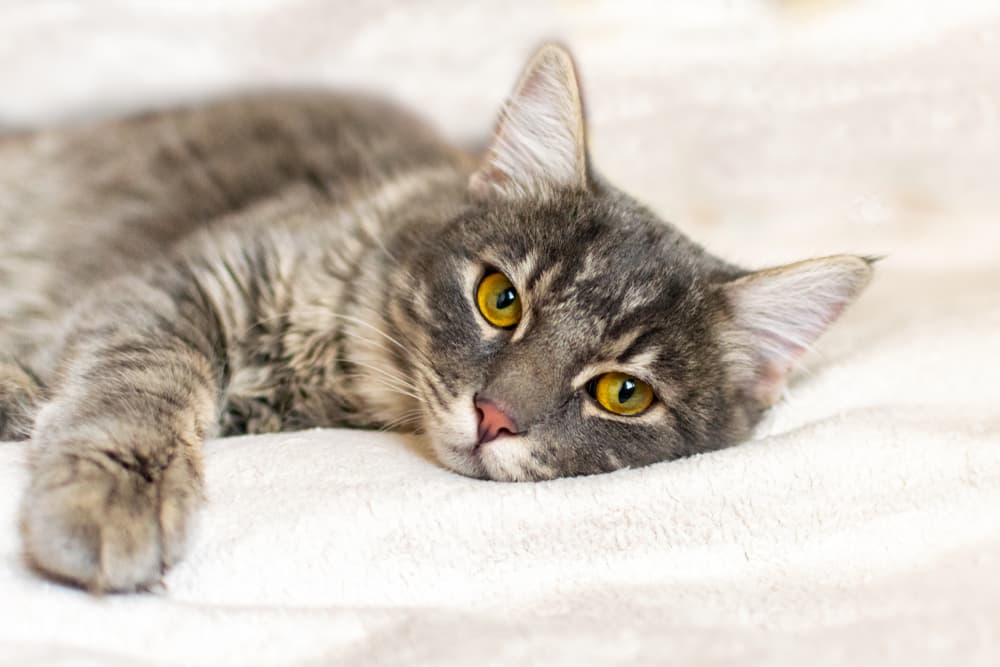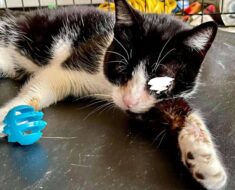It’s important you be able to recognize the warning signs that your cat is crying for help. It may be difficult to know if subtle changes in your cat indicate a health problem. Cats are experts at hiding illness. In the wild, this instinct can protect them from predators or other cats that might be a threat. Common signs that a cat is sick include vomiting, diarrhea, loss of appetite, lethargy, increased thirst, and many more. Learn the 18 most common symptoms for cats and what situations are an emergency.

Signs Your Cat Is Sick
By the time you actually notice something is wrong with your cat, it might have been going on for a longer amount of time than you think. Note subtle changes in behavior and watch for more. Observe your cat’s demeanor and body language. Does something seem off? Learn what is normal for cats and know what is normal for your cat. Never ignore obvious signs of illness. When in doubt, contact your veterinarian for advice.
Vomiting
Your cat throwing up every once in a while is not a concern.1 However, keep track of the timing and frequency to see if there’s a pattern. Anything more than occasional, random vomiting warrants a trip to the veterinarian.
Loss of Appetite
This can be normal for cats but it still should not be ignored. If your cat skips the occasional meal but otherwise eats normally, watch closely for trends. If your cat stops eating entirely or is only eating tiny amounts, you need to get your veterinarian involved. Lack of eating for even a couple of days can lead to a serious problem called fatty liver or hepatic lipidosis.
Increased Appetite
A cat eating too much may also be a concern, especially if it comes on suddenly in an older cat. Hyperthyroidism may be the explanation, but your vet will need to run tests to be sure.2 Increased appetite should not be ignored, even in younger cats. If nothing else, it can lead to overeating and obesity.
Diarrhea
This may indicate dietary indiscretion, intestinal parasites, and a variety of other problems.3 Left untreated, diarrhea can lead to dehydration and further intestinal inflammation. It’s also very uncomfortable for your cat. Schedule a vet appointment and, if possible, bring a stool sample.
Weight Changes
Fluctuating weight in cats is always concerning, whether it’s gain or loss.4 Either might be a sign of an underlying health problem. Weight loss is more urgent in the short term whereas weight gain is usually more harmful over time. If you are not sure about your cat’s weight, make a vet appointment for a check-up or at least a weight check.
Lethargy
A perpetually worn-out cat is a problem, even if it’s subtle. Contact your vet if your cat seems to be lying around a lot, sleeping more than usual, or just generally has a low energy level. There is probably something going on with your cat’s health.4
Increased Thirst
It can mean many things in cats. Most often it means there is a problem like kidney disease or diabetes mellitus.4 Many owners never even see their cats drink water. So, if you start noticing your cat near the water dish more than before, it means something.
Changes in Urination
These are always important to address. They often indicate a urinary tract issue or kidney problem. If you notice a change in frequency or quantity of urine, inappropriate urination, or blood in the urine, schedule a vet appointment. If your cat is straining to urinate and nothing is coming out, this might be an emergency, particularly in male cats.5 Bring your cat to a vet immediately.
Changes in Breathing
Wheezing, rapid breathing, shortness of breath, and raspy breathing should never be ignored.
Discharge From Eyes or Nose
Your cat could have an upper respiratory infection.4 This can make your cat feel ill and stop eating. It may be contagious to other cats in your home. Your vet may recommend medications to help your cat recover faster.
Ear Debris or Discharge
If you see this, your cat could have an ear infection or even parasites like ear mites. Waiting to address this may cause the eardrum to become affected. Plus, it is very uncomfortable for your cat.
Skin Irritation or Hair Loss
This could indicate several problems, including allergies, external parasites, or another skin condition.6 It’s also likely painful or itchy. Don’t let your cat suffer needlessly. Your vet may be able to offer treatment options.
Increased Vocalization
More meows or crying may mean your cat is sick, in pain, stressed, or just bored. It’s important to rule out a health issue first before you explore the behavioral side of this issue.
Overgrooming
It may be behavioral, but it could also mean your cat has a skin issue or is in pain.4 If you notice overgrooming, start with a vet visit to try to get to the root of the problem.
Personality Changes
These can be normal when they happen over time, especially as your cat ages. However, if your normally friendly cat is showing aggression, or your happy, confident cat is suddenly acting afraid, there is a need to further explore with your vet. If your cat seems confused or disoriented, then it’s an even more urgent situation.
Limping, Trouble Jumping
These are tell-tale signs of an injury or a condition like arthritis.4 Don’t assume your cat is painless because he is eating and acting normally otherwise. See your vet so the injury or condition can be treated appropriately.
Swelling
Don’t ignore swelling in any area of the body. It may be a wound that has turned into an abscess. It could even be a tumor.7 Watch the swollen area closely. If it is painful, hot to the touch, or does not get better in a day or two, see your vet.
Bad Breath
This is a sign of dental problems. Mild halitosis may not be urgent, but it means your cat’s teeth should be checked soon. Severe bad breath should be addressed sooner. Also, watch for excessive drooling and bleeding from the mouth. If your cat has an oral infection, it exposes the whole body to the bacteria in the mouth.8 This could lead to problems with the heart and other organs.




